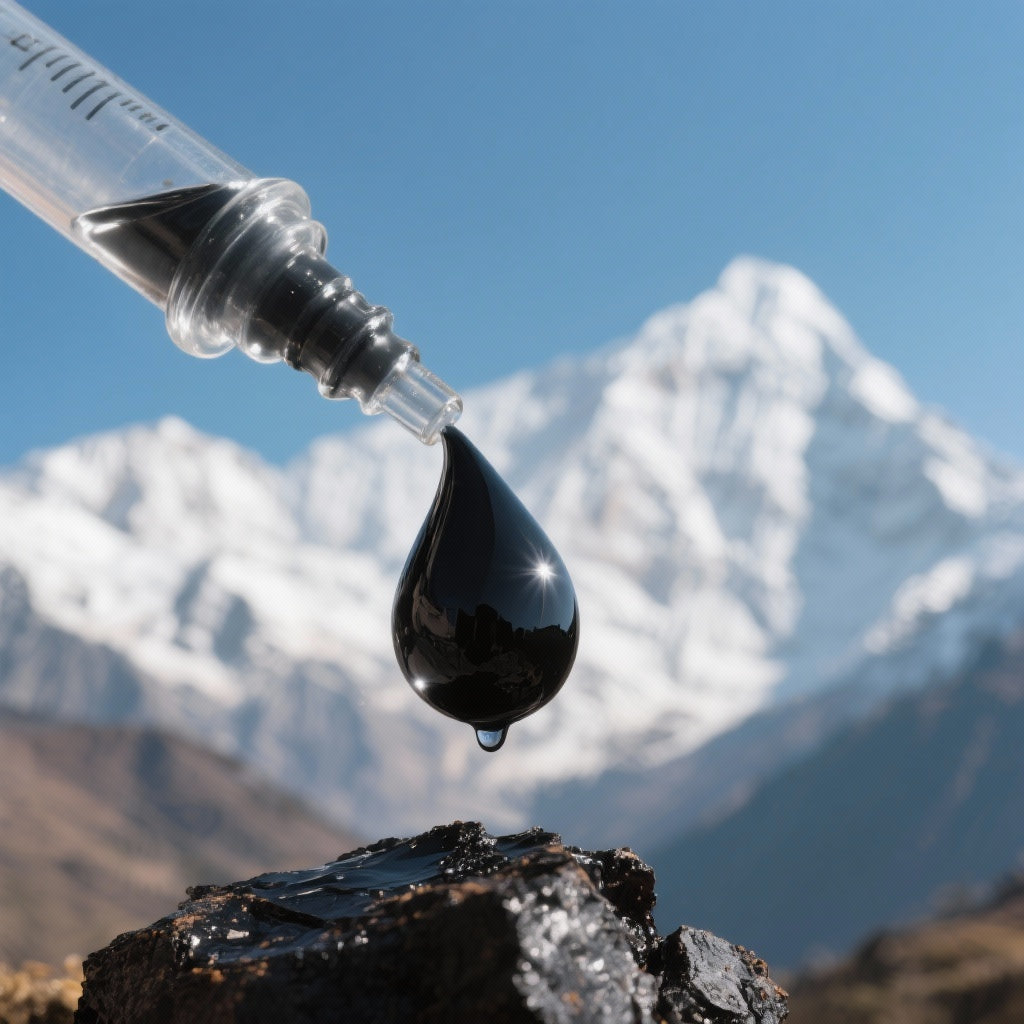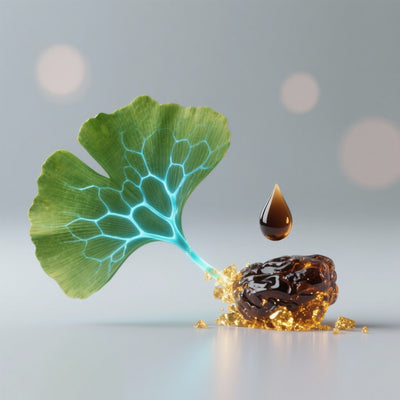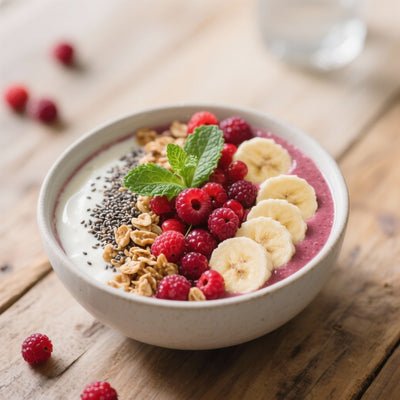10 randomized clinical studies that validate the effectiveness of Shilajit on human health
Often touted as a miracle cure in Ayurvedic medicine, Shilajit inspires as much curiosity as skepticism. How can we separate myth from reality? The answer lies in science. Far from anecdotal evidence, rigorous, randomized, placebo-controlled clinical studies have scrutinized its effects. This article takes you to the heart of the research and presents 10 concrete scientific proofs that demonstrate the tangible benefits of Shilajit on energy, hormones, cognition, and much more. Get ready to discover what science truly says about this ancient mountain treasure.
The science behind "Blood of the Mountains"
Shilajit is a natural resinous substance, rich in fulvic acid and over 84 essential minerals. But beyond its impressive composition, it is clinical trials on human subjects that validate its therapeutic potential. Here are 10 landmark studies that have put Shilajit to the test.
-
Significant increase in testosterone levels
One of the most well-known uses of Shilajit relates to men's health. A randomized, double-blind, placebo-controlled clinical trial published in Andrologia in 2016 examined this effect. Healthy male volunteers aged 45 to 55 received either 250 mg of purified Shilajit or a placebo twice daily for 90 days.
A key finding: The Shilajit-treated group showed a significant increase in total testosterone (+20.45%) and free testosterone (+19.14%) compared to the placebo group. Levels of FSH and LH hormones, which stimulate testosterone production, were also maintained.
Conclusion: Purified Shilajit can be used to naturally increase testosterone levels in healthy men.
-
Improving male fertility (spermatogenesis)
Beyond testosterone, sperm quality is crucial for fertility. A previous study, also published in Andrologia (2010), examined infertile men. For 90 days, participants received 100 mg of Shilajit twice daily.
Researchers analyzed several sperm parameters before and after treatment. The results were spectacular:
- Total sperm count: +61.4%
- Sperm motility: +12.1% to +17.4%
- Normal sperm: +18.9%
- Oxidative stress markers: Significant decrease
Conclusion: Shilajit has a powerful effect on spermatogenesis, improving both the quantity and quality of sperm, making it a potential ally for couples seeking to conceive.
-
Combating chronic fatigue syndrome (CFS)
A feeling of constant exhaustion characterizes chronic fatigue syndrome (CFS). A 2012 study explored the potential of Shilajit to restore energy at the cellular level. The study model induced CFS in laboratory subjects and then administered Shilajit for 21 days. The researchers focused on Shilajit's role in protecting mitochondria, the "powerhouses" of our cells.
Key discovery: Shilajit treatment reversed behaviors associated with fatigue and anxiety. It prevented mitochondrial dysfunction and energy (ATP) loss, suggesting a direct action on cellular energy production.
Conclusion: Shilajit helps manage chronic fatigue syndrome by improving mitochondrial function and reducing oxidative stress.
-
Neuroprotective potential and cognitive support
Fulvic acid, the main component of Shilajit, is a potent antioxidant. A study published in the International Journal of Alzheimer's Disease hypothesized that fulvic acid may interfere with the accumulation of Tau proteins, a hallmark of Alzheimer's disease. While this research is ongoing, Shilajit's antioxidant and anti-inflammatory properties show promise for long-term brain health.
Conclusion: Thanks to its unique composition, Shilajit is being studied for its potential to support cognitive function and protect against age-related neurological decline.
-
Adaptation to high altitude
Traditionally used by the people of the Himalayas, Shilajit helps the body adapt to the lack of oxygen at high altitudes. A study has highlighted its role in managing altitude sickness. It helps combat hypoxia, anxiety, fatigue, and gastric problems associated with altitude.
Mechanism of action: Shilajit helps transport oxygen more efficiently into tissues and has nootropic (cognitive-boosting) properties that improve mental clarity under stressful conditions.
Conclusion: Shilajit is a powerful adaptogen that can help improve physical and mental performance at high altitude.
-
Treatment of iron deficiency anemia
Iron deficiency anemia is a global health problem. A study evaluated the effectiveness of Shilajit in treating this condition. Subjects received 500 mg of Shilajit daily for 21 days.
The results showed a progressive and significant increase in all blood parameters studied:
- Hemoglobin levels
- Hematocrit
- Red blood cell count
Conclusion: Rich in iron and fulvic acid which improves its absorption, Shilajit is an effective natural option to combat iron deficiency anemia.
-
Improved heart health and reduced cholesterol
Cardiovascular health is a major concern. A study on healthy human volunteers showed that taking Shilajit (2 grams per day for 45 days) had beneficial effects on blood lipid profiles. Participants experienced a significant reduction in total cholesterol and triglycerides , while increasing HDL ("good" cholesterol).
Conclusion: Shilajit contributes to better cardiovascular health by improving the lipid profile and enhancing antioxidant activity.
-
Bone health and accelerated healing
Shilajit is also being studied for its effects on bone regeneration. One study examined its impact on the speed of fracture healing. Patients treated with Shilajit showed significantly faster callus formation (the new bone mass that forms around a fracture) than the control group, reducing healing time by several weeks.
Conclusion: The rich mineral composition of Shilajit promotes bone regeneration and can accelerate fracture healing.
-
Anti-inflammatory and analgesic properties
Chronic inflammation underlies many diseases. Shilajit has demonstrated notable anti-inflammatory and analgesic properties in several studies. It works by regulating pro-inflammatory cytokines and protecting cells from oxidative damage. In a study on arthritis, it significantly reduced joint edema and inflammation.
Conclusion: Shilajit acts as a natural anti-inflammatory agent, offering potential relief for inflammatory conditions such as arthritis.
-
Improved muscle performance and recovery
Athletes are constantly seeking ways to improve their performance. A study published in the Journal of the International Society of Sports Nutrition revealed that Shilajit supplementation improved the retention of maximum muscle strength after strenuous exercise. It also promoted the expression of genes related to muscle tissue adaptation, repair, and regeneration.
For athletes: This translates into better endurance, increased resistance to fatigue and faster recovery after training.
Conclusion: Shilajit is a promising ergogenic supplement for improving physical performance and optimizing muscle recovery.
Frequently Asked Questions (FAQ) about Shilajit
Is Shilajit safe to consume?
Yes, when it is purified and of high quality. Raw Shilajit can contain heavy metals and contaminants. It is crucial to choose a reliable source that provides certificates of analysis. The cited clinical studies used doses ranging from 200 mg to 500 mg per day without significant side effects.
How long does it take to see results?
The effects can vary. Some users report an increase in energy within a few days. For deeper physiological changes, such as increased testosterone or improved blood markers, studies show significant results after 8 to 12 weeks of continuous use.
How to choose a quality Shilajit?
Look for Shilajit in its pure resin form, which is its most traditional and least processed form. Make sure the product has been third-party lab tested for purity and heavy metal content. Brand transparency is a great indicator of quality. To learn more about quality supplements, visit our main information blog .











